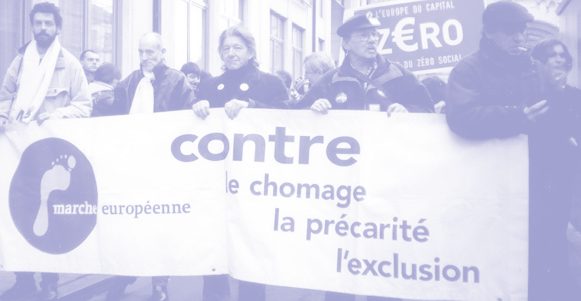

 |
 |
 |
 |
 | ||
European Marches
|
||||||||||||||
| ||||||||||||||
The right to benefits |
||||||||||||||
won’t be guaranteed at the European level : this may lead to a complete unravelling of social rights!Marie-Paule Connan (Euromarches, Belgium) 
What is the European strategy for employment? a methodical unravelling of the social structurations through putting pressure on people whose incomes are the lowest. What about the European Constitution ? Indeed, the string would be pulled out. The right to benefits would be removed. There would be no possible recourse to any right. Since 1997, the EU employment policy aims at putting into question the rights of work and the collective agreements. The Euromarches against unemployment, precariousness and exclusion analysed the Employment chapter of the Amsterdam Treaty when it was signed; they immediately alerted people about the risks of social suffering that it would create. The announced mechanism aimed to destabilise the most fragile categories of workers and the unemployed. The chosen vocabulary was particularly condemning: unemployability, unadaptability, lack of entrepreneurship. The EU Treaty since 1997 indicates that the employment policy has to be compatible with the Broad Economic Policy Guidelines (BEPG.) What were these BEPG ? Reading the European Commission’s reports on that subject, we realised the consequences of concretising that compatibility: « To obtain the desired results, in order to level down the wage scale there needs to be a 20-30 % decrease in wages costs for low skilled work, as happened in the States in the 70-80s. In order to be efficient, such a measure would imply in Europe the same decrease in unemployment benefits and social benefits to escape the « poverty trap. » » Such a method would create a more unequal income distribution and could create categories of the working poor, who could not live on their wages. In the States, this induced a change of orientation, with the implementation of a social aid scheme called Earned-Income Tax Credit In Europe this would mean that part of the money spared on unemployment benefits would have to be directed to other forms of social transfers and would not help in lightening the strains on public spending. « Such a decrease in wage costs would be hard to implement in the EU; it is possible nevertheless to go this way, by reaching pragmatic collective agreements between social partners, through implementing « insertion » wages for the long term unemployed.” Communication from the Commission entitled « Growth and Employment in the stability-oriented framework of EMU — Economic policy reflections in view of the forthcoming 1998 Broad Guidelines » » The ECOFIN BEPGs motivate and build the national systems according to an irreversible rhythm which imposes each year « recommendations » that States have to make reports on. These reports are evaluated and concluded with reprimands if they aren’t implemented. This evaluation is always in the same terms, repeated every year : « Some progress has been made, but the decision makers have to continue their efforts. The member states have to tackle the lack of flexibility in their labour markets, take measures to reform their benefits systems » Seven years later we can now see that this strategy has been completely implemented. The future of the European strategy for Employment.The European Commission has written a series of communications which announce the complete domination of the decisions of the economic and finance ministers (Ecofin council). « through the rationalisation of the European process implemented for coordination in the fight against social exclusion by the European strategy for employment, for the implementation of the European interior market . (privatisation of public services). and the BEPGs. » The BEPGs will be the motor of this planned process every three years. For that the ECOFIN council has announced its priorities which are a new reinforcement of sanctions towards people threatened or touched by unemployment or social exclusion. The member states will be asked to change their benefits systems so that « they favour participation in the labour market and avert the poverty and unemployment trap » They also will have to reform their taxation systems and wage systems « so that they take into account the link between social evolution , price stability and the labour market conditions. » The economic and finance ministers also ask to reinforce the efficiency of the active programmes of the labour market to improve the mobility of workers to increase manpower in all employment categories (Older people immigrants and young people.) In order to imagine the future as it is scheduled by the dominant ideology of European institutions we have to link this unique process (iniquitous !) of coordination of economic policies of competition for privatisation of public services, and of social protection including social inclusion , health and pensions and the exclusion of rights to benefits from the list of common rights of the EU members. The future of the rights to benefitsThe EU charter of fundamental rights, integrated in the European constitutional project, doesn’t recognise the right to work, neither a right to social benefits. In rights (pensions unemployment benefits, etc ) Nor the right to a living income, nor the right to housing but it only recognises the freedom to work and to look for employment in another member state. The access to benefits and to social aid where they exist. There is no question of justiciable rights but only objectives to reach « according to the modalities established by the communitarian EU rights legislation and the National legislations. » Moreover, this charter doesn’t mention transnational rights to trade union action and to strike. On the contrary, the constitutional project imposes very precise and drastic convergence criteria on the market, on currency, on the liberalisation of public services and the decrease in expenditure on social protection . The states are free to do what they want with their social protection systems under the condition that they reduce their expenses in the social field, nothing is obligatory which implies that redistribution of wealth is not scheduled . Can we imagine a reaction and a proposal of a European law which would aim at social progress ? When we read the constitutional project it seems impossible, as the unanimity of the 25 member states would be needed. Some very big inequalities exist already between the 25 States and they could even deepen. The European constitution would then be the basis of the organisation for the levelling down of rights and of the utmost social dumping. Obviously we are waiting for something completely different. This constitution shows a strong regression compared with the international agreements after the Second World War. In the 1948 Human rights declaration and in the 1961 Turin social charter the aim was to place these obligations on all states:
Our objective of the levelling up and of the implementation of a European collective solidarity system could be possible only if these rights were obligatory in all 25 states. This solidarity would be effective if it was expressed according to a percentage of the wealth of each country. We expressed this demand before this European constitutional project. We expressed it as 50% of GDP per head . We never imagined that these rights could be put into question. Yesterday , before 2000 we said : « We have rights, we want more. » Today the European constitution project says « tomorrow you won’t have any social rights anymore. » This is not acceptable!! |
||||||||||||||
|
<< 3. A concerted policy and its consequence 
02/08/04
|
||||||||||||||